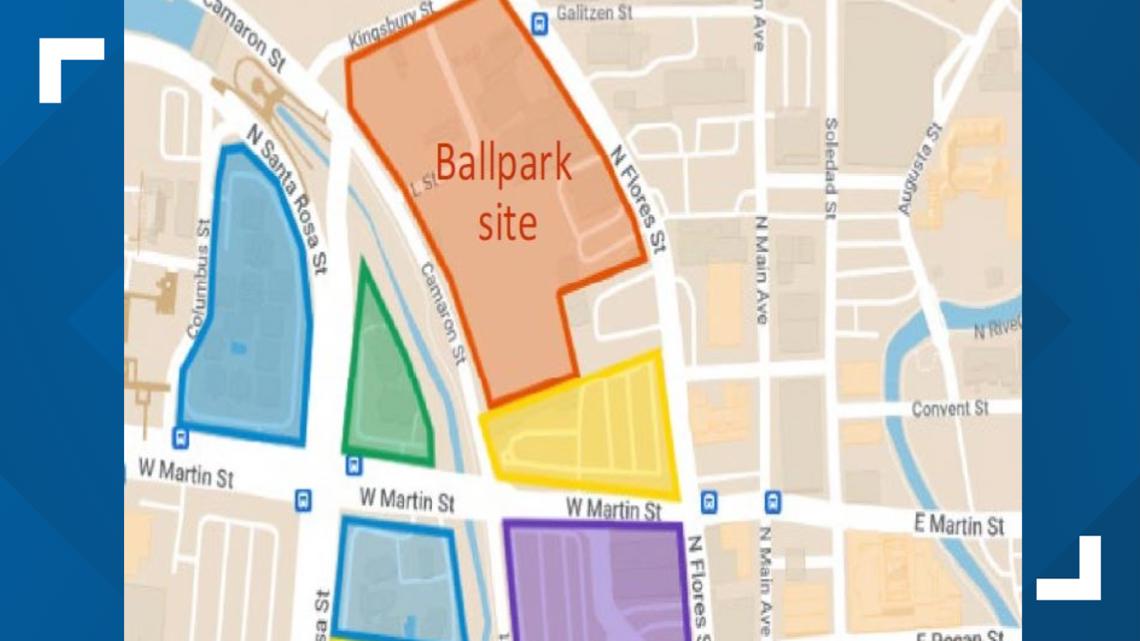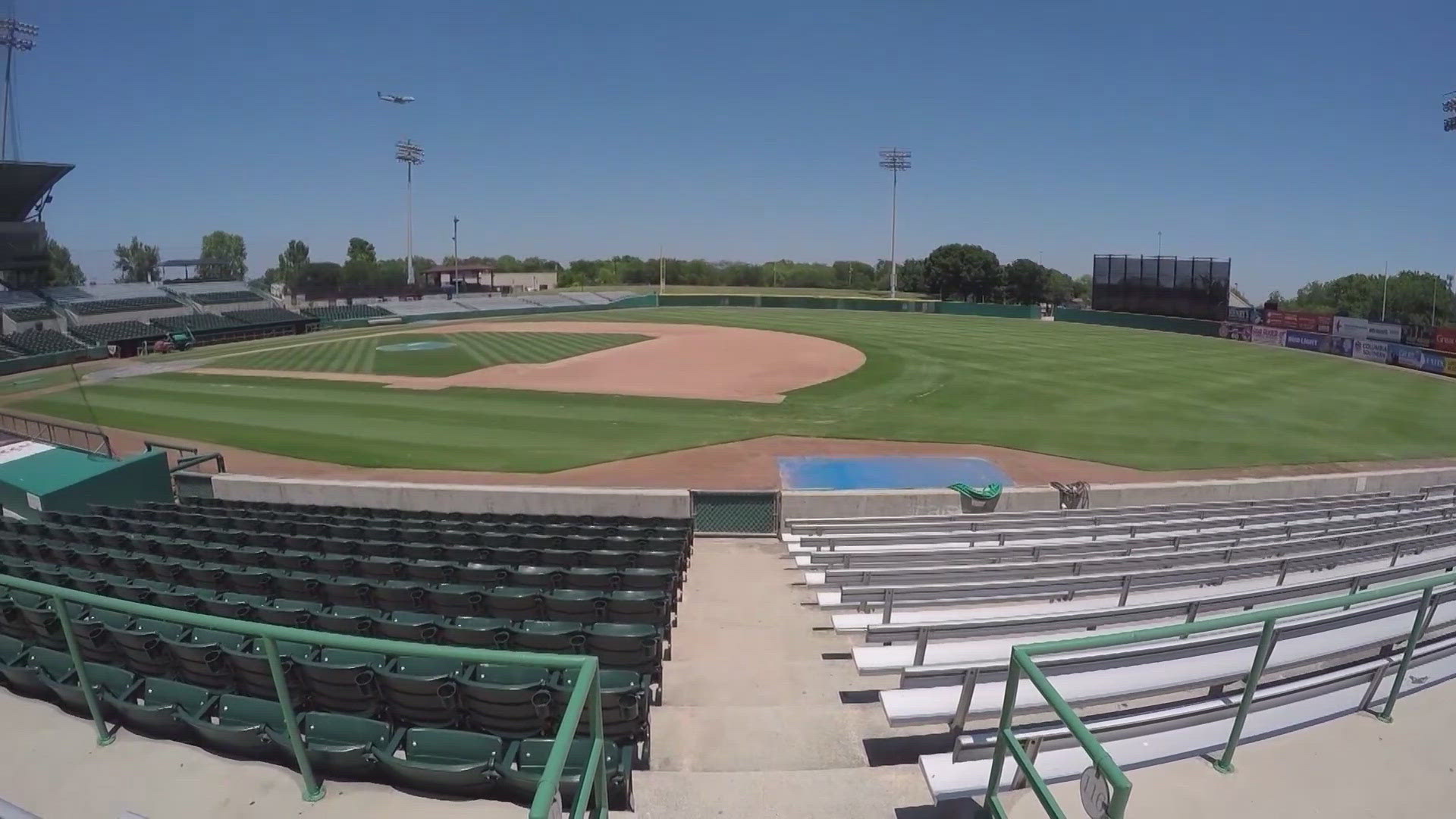SAN ANTONIO — A new downtown baseball stadium for the San Antonio Missions is one step closer to becoming reality now that county commissioner have given their seal of approval.
October 15 is the deadline by which developer Weston Urban, one of the owners of the double-A minor league baseball team, needs to have a Memorandum of Understanding (MOU) signed off by Bexar County and the City of San Antonio to show MLB that plans for the baseball stadium are moving forward.
The commissioners voted 3-1 to approve the memorandum of understanding, with Commissioner Grant Moody voting against the plans and Commissioner Tommy Calvert abstaining.
The proposed location of the new ballpark would sit right across from San Antonio ISD district offices on Camaron Street and Kingsbury Street, near San Pedro Culture Creek Park.
A majority of those that publicly spoke during Tuesday's Commissioners Court meeting supported building a baseball stadium in downtown San Antonio.
“I’m just a working-class person with a fixed income, and the Missions are one of the few forms of entertainment that I can afford on a regular basis,” said Mark Gledford, a Missions season ticket holder. “This is a win-win situation for the City of San Antonio and the people that live here, and the investors are willing to put up all the money. I mean, how can you all lose? They’re willing to take the risk and pay for the whole thing.”


A few residents from the Soap Factory Apartments on Santa Rosa Street spoke in opposition. The Soap Factory apartments are owned by Weston Urban and would be demolished to make way for additional development around the proposed stadium.
“I would like to urge you, the judge and commissioners, to truly consider the negative effects of this project,” said Brooklyn Ramos. “I truly want the entire room to understand the heaviness of this project and that good things do not have to come at the expense of hurting our communities and erasing one of the last affordable places to live in our town.”
Texas Organizing Project (TOP), which has been advocating on behalf of the Soap Factory residents, pointed out the turnout at Tuesday’s meeting was skewed in comparison to the turnout at an SAISD meeting discussing the same proposal Monday night, due to the meeting being conducted during working hours.
Bexar County Judge Peter Sakai, Precinct 2 County Commissioner Justin Rodriguez and Precinct 1 County Commissioner Rebeca Clay-Flores have all met with residents separately to hear their concerns.
“We had a lot of great questions asked by each member of the court, although it wasn't unanimous, it was a majority vote,” Sakai said. “I declared that the motion passed. Let's move on, but let's make sure that the people that are most affected by this particular economic development project are not left behind.”
Sakai, Clay-Flores and Rodriguez were the only members of commissioner’s court to agree to the plan. Commissioner Tommy Calvert abstained, and Commissioner Grant Moody voted against the project.
“I really appreciate the concessions that have been made by the leadership group, but I do believe that we could’ve made it better, in my opinion,” Moody said. “I won’t get into all the details there, but I think there’s some proposals, some factors that could’ve further protected the county financially but there’s also some provisions that honestly, I just saw today that I think had been inserted maybe by the city that could be challenging for the Missions to comply with. I don’t want to micromanage a billion dollars in construction projects, but I do want to protect tax payers to the best of my ability and that’s my responsibility as a commissioner for Precinct 3.”
Currently, the plan to build around the stadium is divided into four phases. Phases 1 and 2 of development, Weston Urban says, is guaranteed. If the company doesn’t have Phases 1 and 2 designed, and construction on Phase 1 started, the county and city would not approve the $160 million bonds that would pay for the new ballpark.
“I've not seen anything to this point that suggests that, you know, the developers or anything less than being honest brokers here, but we got to do more than just take people at their word,” Rodriguez said. “There are mechanisms in place that if they are not fulfilling their end of the bargain, we have leverage.”
The City of San Antonio and Weston Urban have pitched in $500,000 to give $2,500 to residents who would have to be relocated. During the City Council meeting to approve the MOU last month, council members suggested that Bexar County also contribute to relocation assistance.
If that were to happen, the county would pay using general fund dollars.
“The county will see what needs are going to have to be met,” Sakai said. “But we're not committing anything today.”
The county did, however, commit to building more affordable housing. The Soap Factory apartments is one of the only places downtown that is considered “market-rate” housing that is not income-restricted.
“The county has now leaned into affordable housing,” Sakai said. “I am committed to help rebuild the affordable housing in the inner core, especially in the area of San Antonio and the school district, especially in the areas around where the school closings have occurred. The only way for these school districts in the inner city core to succeed, to survive on the long term is growth."
One of the largest contributions Bexar County will have to the baseball stadium project is building a 250-space parking garage for San Antonio ISD. The current parking garage next to San Antonio ISD is owned by the county, but the district pays rent to the county to park there.
“We want to make sure that the school campus that will be there across the street has adequate parking and we're not putting anybody out,” Sakai said. “So that's reason why we're negotiating or attempting to negotiate. We have not locked down any agreement with the San Antonio Independent School District, but we are working on a process to find a result.”
Weston Urban is still negotiating with San Antonio ISD to purchase the last plot of land needed to build the baseball stadium. The MOU is non-binding, and Judge Sakai explained a lot of details are still being worked out.
The stadium isn’t set to be complete until 2028. The economic development around the stadium is proposed to be completed by 2031.
This year, Bexar County still has to negotiate an economic development agreement with the owners of the Missions create the San Pedro Creek Development Authority with the city that would own the ballpark and issue the bonds to fund it, as well as adjust the boundaries of the Houston Street TIRZ, which will go towards eventually funding the ballpark.

